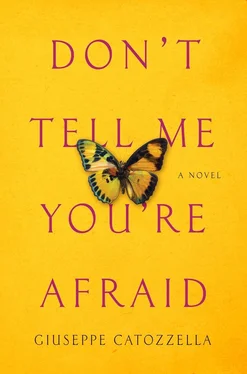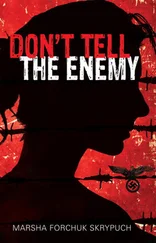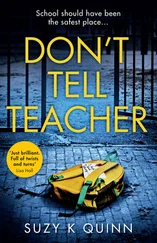“Aabe, I’m ten years old now.”
“Yes, and that’s another reason why if you win…”
I didn’t let him finish. “I’m ten and you’ll see, when I’m seventeen I’ll run in the Olympics. That’s how far I want to go.”
He started laughing.
“Aabe, I’m going to run in the 2008 Olympics, when I’m seventeen. That’s my goal,” I repeated that morning. “You’ll see.” I paused. “In fact, one day I’ll even win.”
“So tell me… where will the 2008 Olympics be held, here in Somalia?” he asked wryly, knowing full well that wasn’t possible.
“No. In China,” I said, still fingering the headband.
“Ah, in China. So you’re going to China, then?”
“Of course, I can’t run in the Chinese Olympics from here, Aabe.”
At that point he looked at me seriously. He’d finally realized that I wasn’t joking.
“All right, Samia, I believe you,” he said, stroking my hair. “If you’re so determined, then you’ll get there for sure.”
Then he shifted in his chair as if to look at me more closely, for the first time seeing me with new eyes. “You’re a little warrior running for freedom,” he said. “Yes, you’re a real little warrior.” As he spoke he started adjusting the elastic band on my forehead. Our fingers touched. “If you really believe it, then one day you will lead Somali women to liberation from the bondage in which men have placed them. You will be their leader, my little warrior.”
It was the first time I’d said that about the Olympics and also the first time it had popped into my head. I had never thought of it before. Yet as soon as I said it, nothing seemed more real to me.
Aabe’s promise of a gift must have been enough to spark something inside of me that I didn’t even know I had. His words had officially sealed my heart.
That day Alì took me to the start of the race in a wheelbarrow so I wouldn’t get tired. I tried to get out of it every way I could, but he insisted, saying he was my coach and that I had to do whatever he ordered. And so I arrived at the start on that throne.
Alì had planned it all out: He left me there and rode a neighborhood boy’s bike up to the stadium to get there early and be waiting for me at the finish line.
It was the usual seven-kilometer route that I had run a thousand times, not a short-distance speed race, which I was better at. But I was thin as a rail and weighed little more than a feather, as Alì said, so I had some advantage over the others.
“You have to learn to fly, Samia,” he kept telling me. “If you learn to fly, you’ll beat them all.”
I was so light that if I learned to catch the wind I would easily be as fast as a rocket; that was his theory.
At first it sounded silly, but then I thought more about it. Maybe he was right. I had to try to make myself as light as possible, direct my weight upward. And try to stay on the outer edge, so I wouldn’t have anyone in back of me and could let the wind push me from behind. Then, once I was out in front, it would all be easier. No one would steal my air.
What I had to do was minimize the contact my feet made with the ground.
I had to learn to fly.
That day, when the starter pistol went off, I forgot everything. It had never happened to me before, but since then it hasn’t failed to happen, every time I’ve won. My mind was able to create a blank and focus only on positive things.
On the day of my tenth birthday I realized that running freed me from my thoughts. And so, meter by meter, kilometer after kilometer, the skinny little girl was able to overtake the majority of the group and get behind the four fastest runners.
In my head were Aabe’s words and the way he had tugged the terry headband down over my forehead.
“One day you will lead Somali women to liberation from the bondage in which men have placed them. You will be their leader, my little warrior.”
From that day on, every time I raced I clocked off meter after meter mulling over those redemptive words of my father, the words of Yusuf Omar Nur, son of Omar Nur Mohamed.
The liberation of my people and of the women of Islam.
That day I won.
For the first time. My first victory.
The race ended with a lap in front of a large crowd of onlookers.
The CONS stadium, used for all sporting events, was old, hammered by bullets, its rickety stands shored up with planks to reduce the risk of collapse, the track riddled with shrapnel from grenades.
Since the start of the war, the new stadium has been used as a depository for the army. Instead of athletes, there were tanks and soldiers on the field. Officers rather than spectators in the stands.
From a distance, as I neared the old stadium, exhausted, I realized how decrepit it was, mutilated by bombs.
At five hundred meters from that ruined structure I was still in fourth place.
When I turned onto Jidka Warshaddaha, with the stadium’s irregular shape on the horizon, I heard Alì’s voice in my head urging me to put the wind at my back and go on to win.
I don’t know where I got the strength, but I began to fly. I passed the two guys in front of me, one after the other.
At the entrance to the stadium my legs nearly started shaking when I saw the multitude of people sitting in the stands. You could feel their excitement, their expectations, the fact that they were there to see someone win.
And I wanted to be that someone.
I entered the stadium second. Meter by meter on the pitted tartan track, I realized that the runner in first place had not measured out his energies well. I felt I still had some in reserve, while he was plodding along, worn out, losing ground with every step.
Then the miracle happened: The people in the stands began yelling and calling me abaayo . Sister.
They’d seen that I was faster and they wanted me to win.
They were cheering me on: abaayo, abaayo .
Every word gave me an extra boost.
After the first curve I had already caught up to the front runner, and in four strides I passed him.
At that point the fans rose to their feet, incredulous and excited. They were all applauding the little abaayo .
A rhythmic applause spurred me on.
Clap-clap. Clap-clap. Clap-clap.
My legs flowed ahead like waves driven by an energy that wasn’t mine; the spectators were the ones pulling me along, like a tractor towing a trailer or like the gravitational pull of the moon and the sun on the sea’s tides.
I crossed the finish line first.
It seemed unbelievable to me.
I ran the last few meters after the finish with arms raised, carried along by the rush of all those kilometers.
Then I bent over my legs and felt a strange warmth on my cheeks: unwanted tears on the little warrior’s face.
I quickly wiped them away before standing up, dead tired but brimming with energy. I could have turned around and retraced the entire course, from start to finish.
Around me the crowd was cheering and shouting, jubilant and ecstatic.
As they went wild with applause, I could read their thoughts: It’s incredible that she won, she’s little more than a child.
It was incredible to me too.
But after a few stunned minutes, a medal was slipped around my neck.
Which told me that it was all true.
Alì and I waited in the locker room for the crowd to leave the stadium. He talked to a lot of people who asked him who I was.
He introduced himself as my coach, and it made everyone laugh, because he was only ten years old. He was tall for his age, tall and skinny, but he too was little more than a child. Yet for years he’d been acting like a grown man.
To get home we retraced the route of the race.
Alì told me how he’d felt when he saw me enter the gate of the stadium and how excited the crowd had been when I passed the other runners. He was all keyed up.
Читать дальше




![Ally Carter - [Gallagher Girls 01] I'd Tell You I Love You But Then I'd Have to Kill You](/books/262179/ally-carter-gallagher-girls-01-i-d-tell-you-i-lo-thumb.webp)







